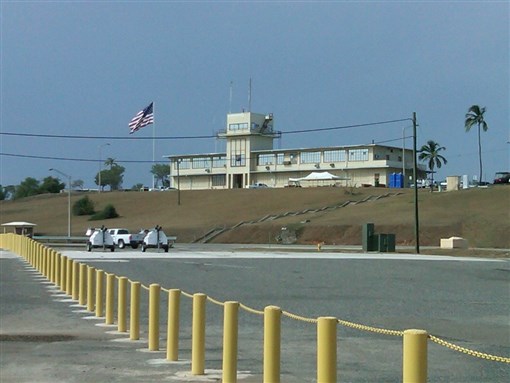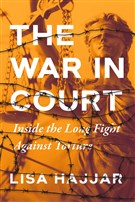The Guantánamo military commission trial of Canadian child soldier Omar Khadr began on August 12. But at 4 p.m. on the first day, Khadr’s lawyer, Lt. Col. Jon Jackson, collapsed in the courtroom from extreme pain related to a surgery he had earlier in the summer. Jackson and all the other trial participants and attendees—except Khadr, of course—were transported back to the mainland. Had the trial not been interrupted, by now the forty-some scheduled witnesses would have testified, the seven-member military jury would have rendered its verdict, and we would already be pondering how to write this new chapter in the history of the “war on terror.” Jackson’s medical emergency suspended the trial and, in a sense, history-making itself. The jurors will be back in their box and the trial will resume on October 18. And so we wait.
The historic importance of the Khadr case cannot be overstated. (For background on this case and the military commissions, see http://www.merip.org/mero/mero072610.html.) The three most significant issues to be dramatized in that courtroom on the south side of Cuba and decided by the jury are (1) the persuasiveness of the government’s evidence which the defense contends was derived from torture; (2) the legitimacy of militarily prosecuting a person who was a child at the time of arrest (Omar was 15 when he was captured in Afghanistan in 2002 and 16 when he was transported to Guantánamo); and (3) the acceptability of the Bush-Obama reformulations of the laws of war which have, in essence, fabricated new kinds of “war crimes.”
Khadr is charged with murder for allegedly throwing the grenade that killed a Special Forces sergeant, Christopher Speer. He is also charged with attempted murder for allegedly making improvised explosive devices that might have been planted along Afghan roads to attack US and allied forces. And he is charged with conspiracy, providing material support for terrorism and spying. Despite Khadr’s youthfulness and, as the defense will argue, his lack of choice in the relations and activities that preceded his capture (he was sent from Pakistan to Afghanistan by his father to serve as a translator for an al-Qaeda operative), prosecutors have insisted that he willfully joined and conspired with al-Qaeda and that he is culpable for war crimes. The government’s case rests heavily on statements he gave to interrogators between 2002 and 2005.
In April and May, during pre-trial hearings on defense motions to suppress Khadr’s self-incriminating statements on the grounds that they were the product of torture and are, therefore, involuntary and unreliable, numerous witnesses testified about the conditions under which he was interrogated. According to Khadr’s affidavit and some of the testifying witnesses, at Bagram he was beaten, threatened with rape and snarling dogs, hung by his wrists for hours which exacerbated the pain of his injuries, hooded and soaked with water until he began to suffocate. His captors shined bright lights into his eyes, which had been damaged by shrapnel. His main Bagram interrogator was later court-martialed in connection with the beating death of the Afghan taxi driver Dilawar (the subject of the Oscar-winning documentary, Taxi to the Dark Side). At Guantánamo, Khadr was again beaten and threatened with rape and dogs, had his hair pulled out, was subjected to protracted sleep deprivation under the “frequent flyer program,” and was doused with a pine-scented cleaner and used as a “human mop” on the floor where he urinated after being denied access to a toilet. He was sequestered in isolation for protracted periods, and force-fed after he joined the prisoners’ hunger strike.
Many trial observers had expected the presiding military judge, Col. Patrick Parrish, to follow the pattern of other judges in previous military commission cases by retaining the statements from Guantánamo but excluding those from Bagram. Instead, on August 9 Parrish ruled that he found “no credible evidence” that Khadr had been abused or that his treatment constituted violations of (post-9/11) US law, and therefore all statements are admissible. Consequently, the trial proceedings will reproduce the question that animated those pre-trial hearings: was Khadr tortured? Many of the same witnesses will be called to testify again and the jurors will have the opportunity to decide whether Khadr’s statements are reliable in light of what they hear about the tactics used to elicit them. The larger implication is that those seven officers, none of whom have a legal background, are vested with an historic responsibility to assess and determine the standards that constitute the line between torture and not torture for the world’s lone superpower. This line has been the subject of ongoing, fierce debate since the first batch of Bush administration “torture memos” was made public in mid-2004.
The child-soldier aspect of this trial also bears historic significance. Khadr was one of the first ten Guantánamo prisoners to be selected for prosecution in the military commissions, and he is the only one who has been charged with a “hot war” violation. (Other charged prisoners are accused of terrorist acts outside theaters of war, material support for terrorism and conspiracy.) In 2005, when he was first charged, US officials claimed that his would be one of the easiest cases to prove, suggesting that the process would be quick. Yet by the time Bush left office, the Khadr case had not gone to trial. Nor, because of pervasive antipathy toward the Khadr family in Canada, has his own government sought his repatriation from Guantánamo.
When Barack Obama assumed the presidency, there was hopefulness among the rule-of-law-restoration crowd that the idea of prosecuting Khadr in a military commission would be abandoned in favor of the internationally sanctioned route of rehabilitation for children captured in war, but that hope has long since died. On May 21, 2009, Obama reversed his own cancellation of the military commissions which he had previously characterized as fundamentally flawed, in October he signed into law the Military Commissions Act of 2009 and in November Attorney General Eric Holder announced that Khadr was one of five people designated for prosecution in the commissions.
The Omar Khadr case is indisputably an embarrassment for the government. The Obama administration could have charted a course different from the one set by the Bush administration, but instead officials have acted as though there is no choice but to proceed with the trial. The administration was able to avoid having this be its first prosecution by agreeing to a plea bargain agreement for Ibrahim al-Qosi, Osama bin Laden’s Sudanese cook. That deal—the terms of which remain classified—was concluded the day before the Khadr trial began. Prosecutors tried to negotiate a deal with Khadr, too, but he refused to concede guilt to the charges that the government is pressing against him. Khadr’s prosecutors represent the American government and the outcome of this trial, whatever it may be, will be American history.
The third historic significance of the trial relates to the legitimacy of the legal edifice that was constructed after 9/11. In November 2001, the Bush administration invented the concept of “unlawful enemy combatant” to characterize any foreigner in US custody (who could be “coercively” interrogated and indefinitely detained incommunicado). This status-based interpretation of the Geneva Conventions postulated that people who are not members of regular armed forces but who (allegedly) engage in or materially support military or terroristic attacks against the US have no status or rights as combatants or civilians (the only two categories in international humanitarian law). The Obama administration sought to rectify this status-based and widely criticized interpretation by rebranding prisoners as “unprivileged enemy belligerents.” What “unprivileged” means is “not a member of a regular army,” and ostensibly the categorization was transformed from one based on a fixed status to action—that is, belligerency. But for all intents and purposes, this change was merely semantic.
Many military law experts regard the post-9/11 legal edifice as flimsy for three reasons. First, the government reinterpreted the laws of war in order to treat the status (i.e., captured and imprisoned) of an unlawful/unprivileged combatant/belligerent as the basis for the government’s right to charge and prosecute that person for war crimes—in other words, any alleged criminal activity committed by a person with the status of being a prisoner would be(come) a war crime. Second, the offenses included after 9/11 in the war crimes category (if perpetrated by America’s Islamist enemies), such as conspiracy, providing material support and solicitation of murder, are not actually violations of the laws of war; they are violations of other kinds of laws. Third, military courts, tribunals and commissions should only prosecute war crimes, whereas non-war crime offenses should be prosecuted in civilian courts, either in the country where the crime occurred or, possibly, in the country of the victims. In the case against Khadr, for example, if he actually threw the grenade that killed Sgt. Speer as the government claims, he could be prosecuted for murder in Afghanistan. But a soldier is not a “protected person” under international laws of war, and so to charge that the killing of a soldier in battle is a war crime is a post-9/11 novelty. If these refashioned law of war violations were regarded and treated as universally applicable—as the laws of war are inherently supposed to be, by the same measure that Khadr’s “unprivileged” status makes him subject to the war crimes charge of murder, CIA agents, who are non-military and thus are unprivileged, could be charged by a foreign government with the war crime of murder for operating Predator drones. Last year, the State Department and the Defense Department disagreed over this issue. State argued in favor of restoring the pre-9/11 interpretation of the Geneva Conventions in order to rectify the contradictions and bring the US back into line with international consensus. Had State prevailed, which it didn’t, Defense would not have had any ground for pressing charges against Khadr (or others whom the government wants to prosecute) in the military commissions. Thus the post-9/11 fabrications were retained by the Obama administration, in part, for Khadr.
On the first day of the trial, Jackson clearly appreciated the historic role he is playing. He questioned the government’s first two witnesses about whether there had been armed CIA agents present at the firefight where Khadr was wounded and captured. If my interpretation of his line of questioning is correct, he was trying to expose the broader contradictions and anomalies of the post-9/11 legal edifice, as well as laying the ground for an appeal—perhaps with an eye on the Supreme Court. When Jackson is back in the courtroom in October, he will probably resume this line of questioning. How the jury will understand and decide on these issues will make history.
The Khadr trial is by no means the only waiting-for-history game going. The trial of five prisoners accused of perpetrating the 9/11 terrorist attacks has been indefinitely and inexplicably delayed. Another waiting-for-history question is the meaning of “indefinite” for those 48 Guantánamo prisoners the Obama administration has deemed can be held indefinitely without trial. On another register, the wait is on to know when if ever those responsible for the torture of prisoners will be held accountable. And when if ever will a US court break the current record of justice denied for the victims of US torture? How do we narrate the historic significance of unaccountability and injustice in the present?
Law, when it takes the form of a criminal trial, is dramatic in the most literal sense. The lawyer-players work from their own scripts, crafted over months or even years, hoping that their words will prevail and the outcome will be the one they—not their adversaries—desire. When the verdict is rendered, there is a sense of finality, a “winner” and a “loser.” The defendant’s fate has been decided. History has been made. Yet the meaning of history remains open and available for reinterpretation. By the end of this calendar year, the Khadr trial will be over. And the writing of this history will begin.











